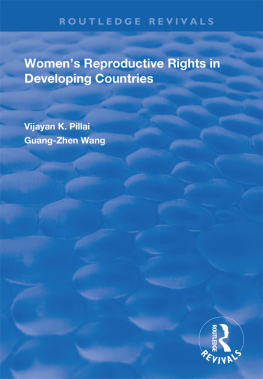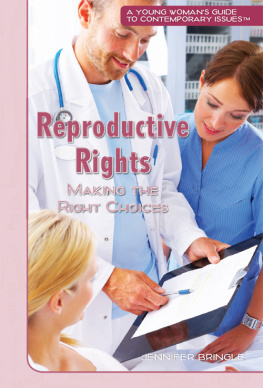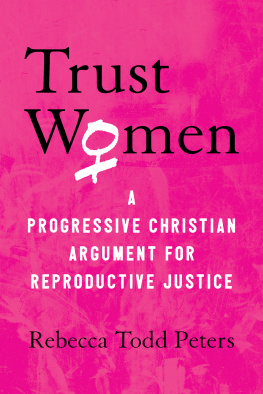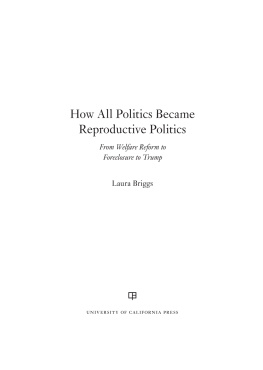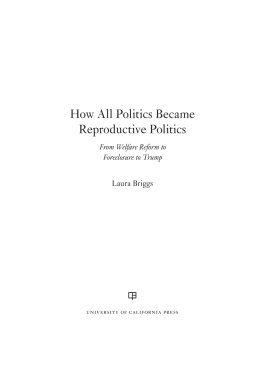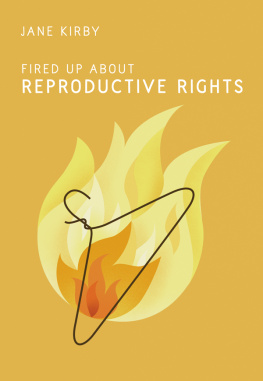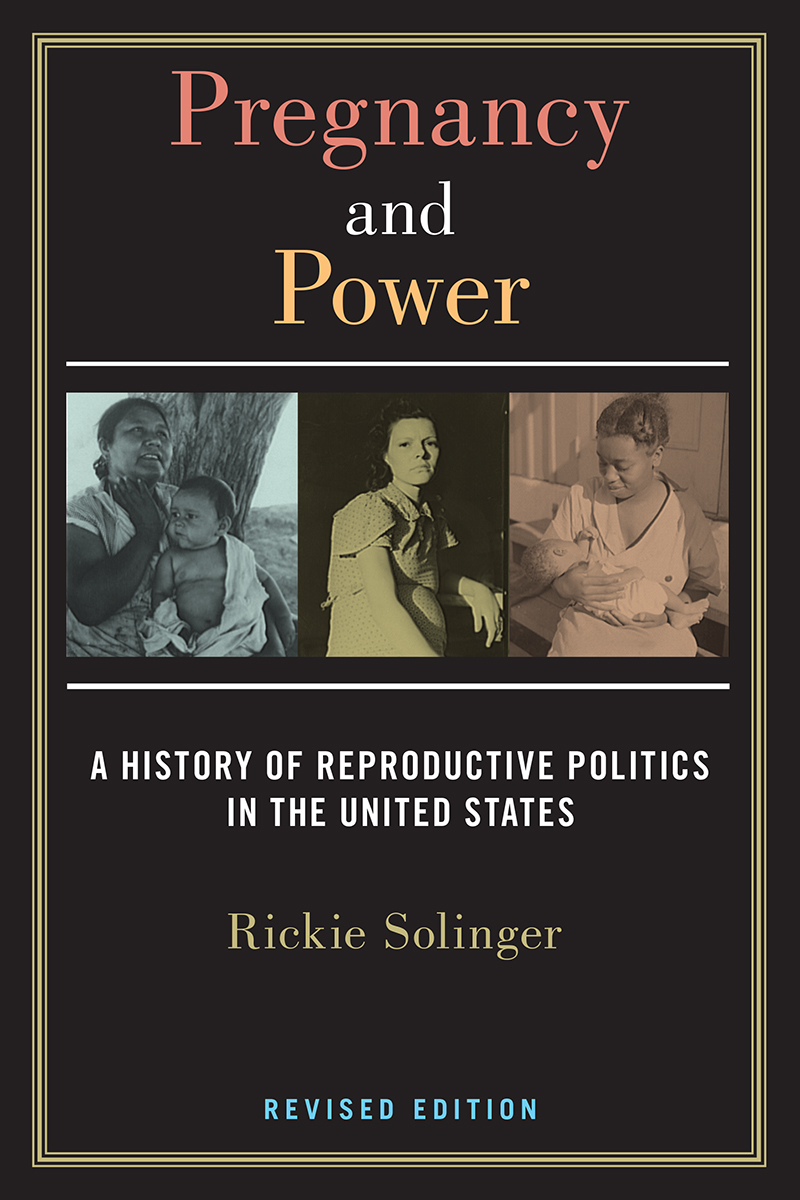
Pregnancy and Power
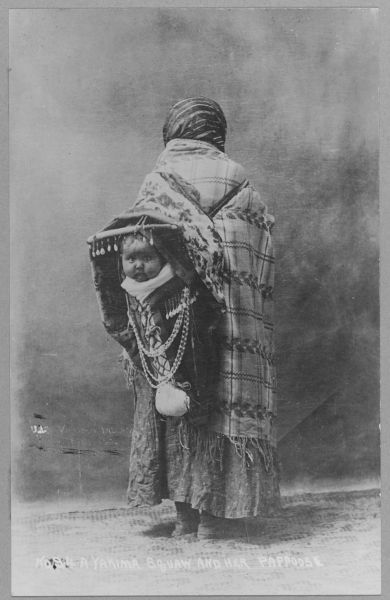
Pregnancy and Power
A History of Reproductive Politics in the United States
Revised Edition
Rickie Solinger

NEW YORK UNIVERSITY PRESS
New York
NEW YORK UNIVERSITY PRESS
New York
www.nyupress.org
2019 by New York University
All rights reserved
References to Internet websites (URLs) were accurate at the time of writing. Neither the author nor New York University Press is responsible for URLs that may have expired or changed since the manuscript was prepared.
Library of Congress Cataloging-in-Publication Data
Names: Solinger, Rickie, 1947 author.
Title: Pregnancy and power : a history of reproductive politics in the United States / Rickie Solinger.
Description: Revised edition. | New York : New York University Press, [2019] | Includes bibliographical references and index.
Identifiers: LCCN 2018043709| ISBN 9781479847457 (cl : alk. paper) | ISBN 9781479866502 (pb : alk. paper)
Subjects: LCSH : Birth controlPolitical aspectsUnited States. | AbortionPolitical aspectsUnited States. | Human reproductionPolitical aspectsUnited States. | Womens rightsUnited States.
Classification: LCC HQ766.5.U5 S67 2019 | DDC 362.1988/800973dc23
LC record available at https://lccn.loc.gov/2018043709
New York University Press books are printed on acid-free paper, and their binding materials are chosen for strength and durability. We strive to use environmentally responsible suppliers and materials to the greatest extent possible in publishing our books.
Manufactured in the United States of America
10 9 8 7 6 5 4 3 2 1
Also available as an ebook
For Nell and Maddy and Sylvie and Nyxi and Ali May and Shiloh and Sasha
who have tolerated my stern eye all of their lives and accepted my love
Contents
What Is Reproductive Politics?
Like many women, I can summon up that old terror at will: being twenty-one and desperate to locate sensations in my breasts, in my belly, the first stains of bloodsigns that my period is coming. I can also remember being twenty-eight and thrilled, my period a week overdue. I must be pregnant! Like many women, I learned early and often that sex-and-pregnancy, what Ill call reproductive capacity, can carry profoundly different meanings, depending on a lot of variables.
Having learned this personal lesson so wellthat a biological event can mean such different things at different times in ones lifeand being committed to social justice, I was drawn into a related scholarly journey. My work is about exploring the ways that reproductive capacity, including childbearing and motherhood, has carried a variety of meanings for and about girls and women in the United States. Pregnancy has carried different meanings, depending on the age of individuals, their race, and whether they are rich or poor or in the middle. The meaning of a pregnancy can also be determined by the historical moment in which it occurs.
Pregnancy and Power is an orientation to reproductive politics in U.S. history. I use the word orientation partly as a sign that the book will not cover every important event and development and movement that has shaped the variety of womens reproductive experiences over time. Nor will it cover the ways that each demographic group has felt the impact of reproductive laws and policies in the United States. In part because of where the bulk of historical sources exist, the experiences of white women and African American women are more fully discussed than those of Latina and Native American women and other women of color. Here is what Pregnancy and Power will do: It will ask, what is reproductive politics? It will build a definition of reproductive politics and use that definition to look at these big questions: How and why have laws and public policies and community attitudes about sex-and-pregnancy changed over time? How have these laws and policies and attitudes shaped the lives of different groups of people differently?
When people have asked me about the book Im working on, and Ive said that its about reproductive politics in U.S. history from 1776 to the present, Ive almost always been met with, Reproductive politics in the eighteenth century?? What does that mean? I hope that readers of Pregnancy and Power will come away from this book not only understanding how matters of sex-and-pregnancy and powerreproductive politicswere key to the development of the United States in the eighteenth century, but also how these matters have continued to shape social and political relationships and the culture of this country throughout its history. I hope that readers will come to the end of the book well equipped to recognize reproductive politics in a newspaper article, on TV, in the doctors office, or wherever it appears. I hope that readers will come away able to construct an informed and reasoned response to the issues involved. To accomplish this task, Pregnancy and Power will weave my own research together with the work of many historians and others who have written about reproductive politics.
This revised edition of Pregnancy and Power marks two developments since the original publication of the book in 2005. First, during the second decade of the twenty-first century, Republican-controlled state legislatures passed hundreds of laws constraining and rolling back reproductive rights that legislatures and courts had previously defined and protected. The 2016 election of President Donald Trump, who aimed to further constrain the right of individuals to manage their reproductive lives, as well as appointments of Supreme Court justices and many judges who oppose reproductive rights, starkly revealed the contemporary fragility of all reproductive rights in the United States, including those that had seemed anchored.
Second, in recent years, the reproductive justice framework has emerged as the most vibrant, capacious, and useful framework for understanding what people require to manage their sexual and reproductive bodies. Reproductive justice advocates point out that pregnancy (getting pregnant or not, staying pregnant or not) is hardly the only reproduction-related issue that shapes the lives of individuals.
Consequently, the reproductive justice framework, which splices together reproductive rights and social justice, goes way beyond the old pro-choice/pro-life debate and rests on three primary principles: the right of all individuals not to have a child; the right to have a child; and the right to parent children in safe and healthy environments. Reproductive justice also claims that safe and dignified fertility management, childbirth, and parenting together constitute a fundamental human right. Proponents of reproductive justice argue that when government officials and other authorities interfere with these matters, they are striking a blow against the humanity of individuals since everyone has the human right to engage in sexual relations, to reproduce or not, and to care for their children with dignity and safety.
The proponents also explain that people can attain these rights only if they have access to such basic resources as quality medical care, decent housing, a living-wage job, a safe and healthy environment for raising children, and good schooling. Without such resources, the concept of choice can quickly become meaningless. In addition, the reproductive justice framework is intersectional, explaining how a persons relationship to a web of factorsrace, class, sexual conformity or nonconformity, and othersand their access to basic resources determine the degree of reproductive dignity and safety any individual can achieve. This revised edition of
Next page

